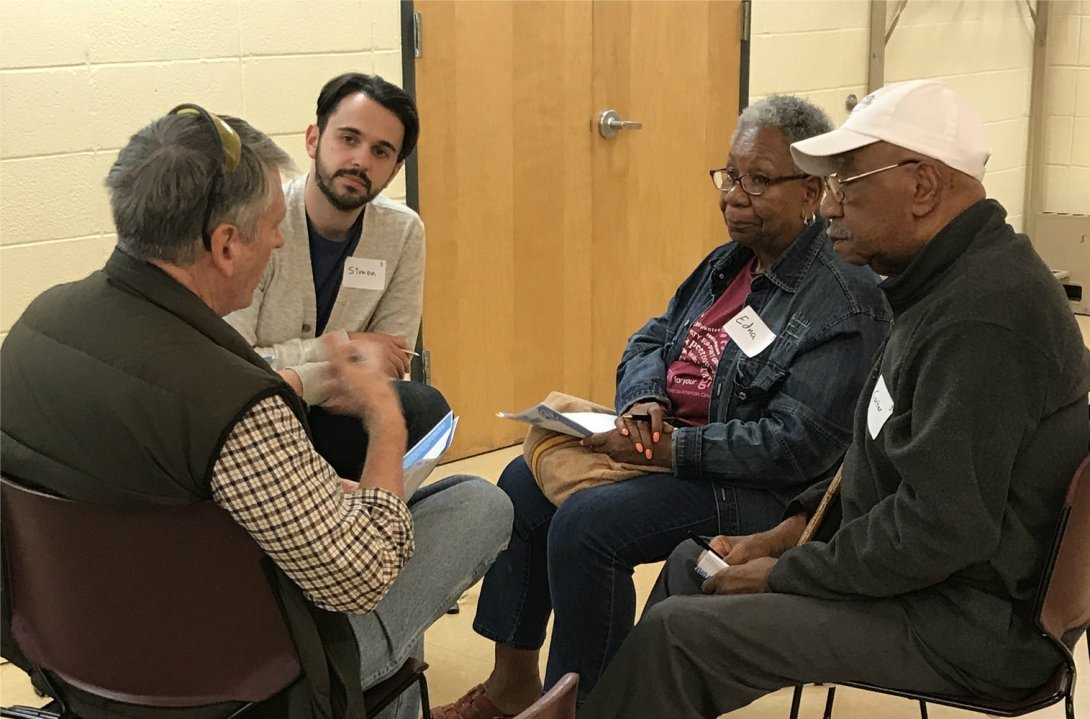What New Jersey Residents Have to Say About the Civic Info Bill

Mike Rispoli
Runaway consolidation has decimated news outlets across New Jersey, leaving many communities without any real coverage.
That’s why Free Press Action Fund has been lobbying to pass the Civic Info Bill, which would allocate $100 million over five years to fund essential news-and-information projects and meet the needs of underserved communities.
The bill would establish the New Jersey Civic Information Consortium, a nonprofit institution that several state universities would run in partnership with digital innovators, community groups, local journalists and everyday people.
This spring Free Press Action Fund held seven community forums across New Jersey to build support for the consortium and gather ideas about projects it could fund.
We asked participants three questions:
1. What are your vital community-information needs?
2. Do you support the idea of the New Jersey Civic Information Consortium?
3. What initiatives for meeting your information needs would you like to see?
About 180 residents participated in the forums. They were held in Asbury Park, Camden, Glassboro, Hackensack, Montclair, New Brunswick and Tuckerton.
Here’s what people said:
On the idea of the consortium:
All participants believe the consortium is necessary — and not a single person objected to using government funds to establish and run it. A strong majority saw the consortium as a major need and a logical use of the windfall the state received from selling off its old public-media stations.
On their information needs:
- They want a more reliable stream of information about what their local governments and schools are up to. They don’t want to have to depend on rumor-laden Facebook posts: “I’m a council person in my borough and we used to have a reporter at every meeting. Now we never see one.”
- Some see sharp drop-offs in the quality of local information: “I live in a news desert that didn’t used to be a news desert, until media outlets started cutting back so sharply.”
- They lament that municipal and school websites are clunky, hard to use and out of date.
- They want aggressive watchdog journalism on local and state affairs.
- They want easy-to-use rundowns on local elections and candidates: “I hate getting all my information as a voter from political ads.”
- They insist New Jersey communities aren’t just a collection of problems. Residents want reports on positive community events, inspiring neighbors, and local youths engaged in constructive activities.
- They want reporting that connects global and national issues — e.g., potential ACA repeal, climate change, jobs — to local communities.
- They are sick and tired of their state being a media stepchild of New York City and Philadelphia. They want homegrown outlets and journalists that cover New Jersey for its own sake, not merely for the amusement of big-city audiences.
Potential ideas for using the money
- Squarespace for New Jersey: Create a set of user-friendly, attractive templates for town, county and school-district websites, built to convey the kinds of essential information residents crave. By choosing a template from this resource, a town or school system could quickly and cheaply do a much better job of providing needed information in a timely manner.
- #ReadLocal campaign: Help New Jersey journalists and outlets doing good work grow their audiences and revenue by promoting quality homegrown journalism on legacy and social media. Working with an entity such as NJ News Commons at Montclair State University, the campaign could pick the best stories each week and share them statewide.
- Media literacy: Create curricula and workshops to help people of all ages, from middle schoolers to adults, become discerning media users who are able to identify fake news. Forum participants saw the state’s libraries as a valuable ally in this effort.
- Civic education institutes: Develop materials and a format for local communities to establish institutes where residents could learn how local governments and school systems really work, and how to engage with them effectively and appropriately.
- AmeriCorps for journalism: Identify promising young journalists, initially via outreach to New Jersey high schools and colleges. After graduating from college, these individuals would receive two-year fellowships to report on undercovered communities or issues, working with established media outlets that would provide mentoring and training.
- Mini-grants for reporting: Offer grants to independent journalists and newsrooms to enable them to work collaboratively on in-depth reports on topics that might otherwise go uncovered.
- Digital public radio for New Jersey: Return quality audio storytelling to New Jersey by offering seed money for podcasts that would cover topics unique to New Jersey. A platform would gather all of these podcasts in one place for state residents to access.
- Local data apps: Create a digital-app template that a community or county could use to provide mobile access to key government data, e.g., restaurant-inspection records, social-service contacts, environmental data, roadwork and traffic data, etc.
Time is running out to pass the Civic Info Bill — urge lawmakers to move it forward today.